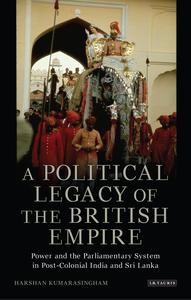A Political Legacy of the British Empire - Power and the Parliamentary System in Post Colonial India and Sri Lanka
By : Harshan Kumarasingham
Release date: Jan 2012
IB Tauris
Number of pages: 312
ISBN: 9781780762289


As the British Empire receded, India and Sri Lanka, then known as Ceylon, preserved the ‘Westminster’ political system left by their colonial rulers. Both South Asian countries became independent in the late 1940s, though in widely differing styles: India fought a violent campaign of mass political activism and would become a republic, while Sri Lanka negotiated independence by a gentlemen’s agreement among the indigenous elite and remained a realm. Both nations adopted the ‘Westminster’ political system of their colonial master, producing results and reactions that would shape
each country profoundly.
Harshan Kumarasingham analyses the crucial first decade of independence, assessing the events, decisions and political environment of these ‘Eastminsters’.The impact of cultural conditions on the constitutional and political exercise of executive power gives an invaluable insight into how the ambiguous and flexible tenets of the Westminster system were
interpreted in a local context, where the Western-educated elites were often at variance with the masses.The principles of cabinet government are explored to examine how successfully the purported checks and balances of the Westminster model operated in this crucial nation-building era, along with the critical role of political figures like Prime Ministers Nehru and Bandaranaike.This period also witnessed the early challenges of forging a modern state with major ethnic, linguistic, religious, class-based and regional tensions, which both India and Sri Lanka still wrestle with.
The adaptable Westminster system was an essential element in the political development of these South Asian nations. Understanding the legacy and influence of the Westminster system allows the reader to fully understand the politics, institutions and society of today’s India and Sri Lanka.
TABLE OF CONTENTS:
1. Eastminster - The Westminster System in India and Sri Lanka
2. Mixed Messages? India's Responses to its British Legacy
3. The Indian Version of First Among Equals - The Battle for Executive Ascendency
4. Indian Federalism - A Paramount Mechanism
5. 'Think of Ceylon as a little bit of England' - Sri Lanka and the British Legacy
6. Unconventional Conventions - Power Partnerships in the Sri Lankan Executive
7. Sri Lankan Communalism - A 'Canker' Ignored?
8. India and Sri Lanka's Eastminsters Compared
9. Conclusion
‘Theoretically sophisticated and empirically rich, this book presents an interesting comparative discussion on how the Westminster system has worked in India and Sri Lanka... Not much has been written so far on the political history of these two nations in the early years of independence and this book fills a major gap in the historical literature on decolonization in South Asia.’
– PROFESSOR SEKHAR BANDYOPADHYAY, Victoria University of Wellington
‘This fine book deepens our understanding of what happens to the Westminster model when it travels east... Harshan Kumarasingham has a gift for making complex, exotic material intelligible and compelling to non-specialists. I say this with conviction as a South Asia specialist, since the story of ‘Eastminster’ in that region contains especially complex,
unfamiliar features which Kumarasingham understands and brilliantly conveys. – PROFESSOR JAMES MANOR, University of London
‘An important and timely book...This book will be of enormous interest to students and scholars with a comparative interest in decolonization, democracy and the post-colonial state. It will also be of great value in informing contemporary debates about how democracy in the Commonwealth can best be nurtured and sustained.’
– PROFESSOR PHILIP MURPHY, Institute of Commonwealth Studies, University of London
‘This is the first book to compare India’s and Sri Lanka’s experience of the Westminster system, and how they reshaped their British parliamentary legacy. Kumarasingham’s fascinating account will be of keen interest to students of history, politics and constitutions.’
– PROFESSOR ROBERT HAZELL, CBE, University College London











